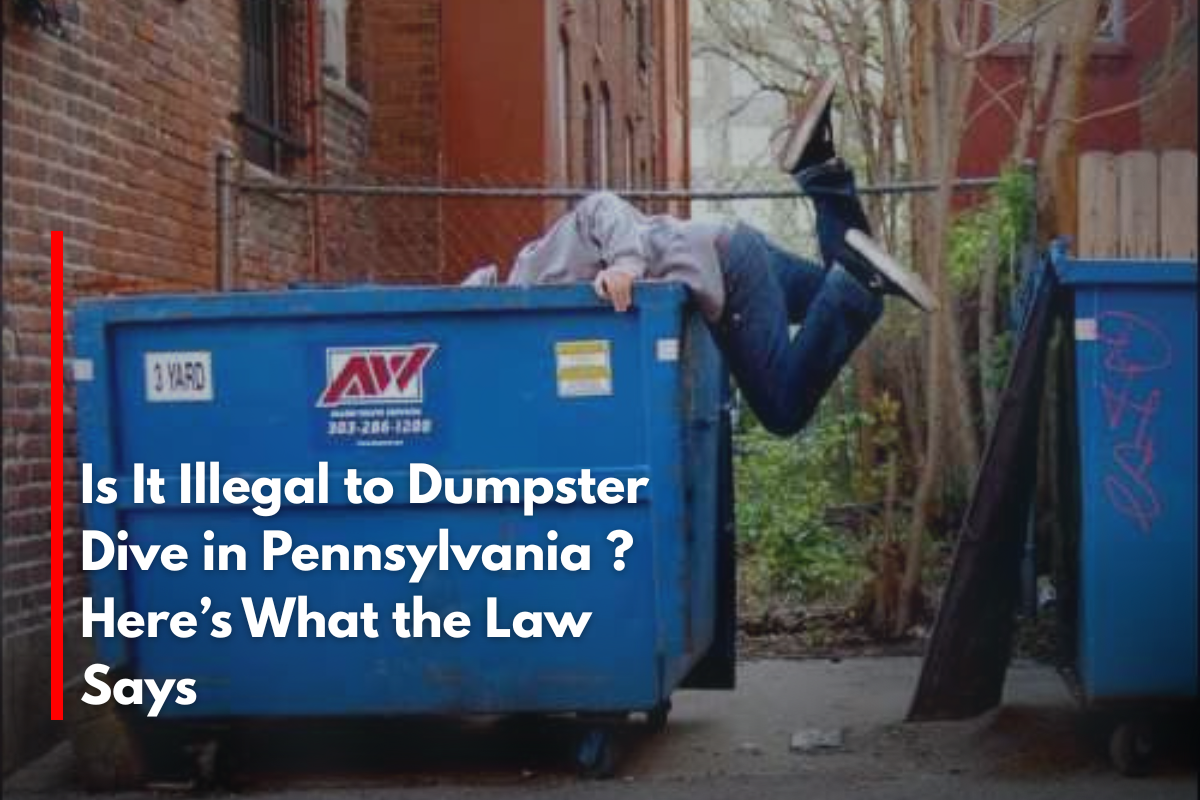Dumpster diving—searching through trash bins or dumpsters for usable items—has a unique legal status in Pennsylvania. There’s no direct state law banning dumpster diving statewide. However, whether or not it’s legal depends on several crucial factors involving property rights, local ordinances, and public safety.
State Law: No Blanket Ban
No statewide prohibition: Pennsylvania does not have a state law explicitly banning dumpster diving. Legally, once trash is set out on public property (like curbside for municipal pickup), it’s generally considered “abandoned” and free to take by anyone.
Landmark legal precedent: This follows the Supreme Court’s 1988 decision in California v. Greenwood, which ruled trash at the curb is not protected by privacy laws once relinquished for collection.
Key Legal Considerations
Trespassing: The main legal risk comes from trespassing. Most dumpsters behind businesses, apartment buildings, or stores are on private property. If you access a dumpster situated on private land, especially if it’s fenced, locked, or posted with “No Trespassing” signs, you can be charged with trespassing—potentially a criminal offense.
Local ordinances: Some Pennsylvania cities and municipalities (including portions of Philadelphia, Pittsburgh, Grove City, Bensalem, and Portage) have ordinances explicitly banning or restricting “scavenging” from trash containers. Violating these rules may result in tickets or fines—even if the bin itself is publicly accessible.
Signage: Diving into dumpsters with posted “No Trespassing” or “No Scavenging” signs is usually illegal. Always obey these warnings, regardless of state law.
Curbside pickups: If items or bags are placed on the curb for city collection (and not specifically marked private), they are generally considered public domain and can legally be taken.
Safety & Health Hazards
Dumpster diving is not without risk. Health and biohazard regulations often cover the handling of waste, and there may be risks of sharp objects, spoiled food, or hazardous chemicals. Divers are not protected by liability laws if they’re injured while on private property or breaking local rules.
How to Dumpster Dive Legally in Pennsylvania
Stick to public property: Only salvage from trash set on curbs or in public access dumpsters with no local bans or posted restrictions.
Check local ordinances: Laws vary from one town to another—always research your city or township’s code before diving.
Respect private property: Never jump fences, unlock gates, or ignore “No Trespassing” signs.
Leave no mess: Create no nuisance and follow good etiquette—leaving trash scattered can get you cited under nuisance or littering laws.
Go during the day: This reduces suspicion and the likelihood of police intervention.
Dumpster diving is generally legal across Pennsylvania—unless you’re trespassing, ignoring posted warnings, or violating local ordinances. Curbside scavenging is usually safe, but always double-check local rules. If you’re stopped by law enforcement or asked to leave by a property owner, comply immediately to avoid legal trouble.
For absolute certainty, contact your local municipal office before diving. Prioritize your safety and respect property rights to keep your hunt for treasures strictly within the law.
Sources
[1] https://ultimatedumpsters.com/is-dumpster-diving-illegal-in-pa/
[2] https://wpst.com/dumpster-diving-laws-pennsylvania/
[3] https://reamsdisposal.com/dumpster-diving-pa-laws/
[4] https://worldpopulationreview.com/state-rankings/dumpster-diving-legal-states
[5] https://www.reddit.com/r/Pennsylvania/comments/1hvf6df/question_about_dumpster_diving_is_it_legal_or/











